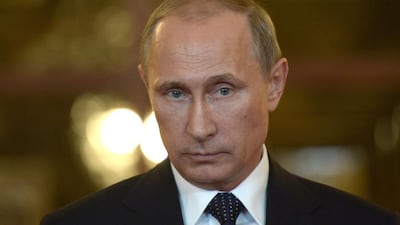The downing of Malaysia Airlines flight MH17 over Ukraine marks a turning point in the confrontation between the pro-western government in Kiev and the pro-Moscow militants on the eastern border with Russia. This dreadful tragedy, in which all 298 people on board perished, has turned a civil war into a major international crisis.
Amid global shock and anger at the loss of innocent lives, the pressure is mounting on the US and the EU to intervene much more decisively against the Kremlin. If it is proved that Russian-backed rebels fired the missile, then we might see much tougher western sanctions that would do real damage to Russia’s economy and isolate Moscow politically.
In turn, that could be a tipping point, either edging all sides finally to resolve the worst East-West rift since the fall of the Berlin Wall in 1989 or else escalating the crisis to new heights.
Historical precedents for the latter scenario abound. Later this month people across the globe will commemorate the centenary of the outbreak of the First World War following the assassination of the Austrian Archduke Franz Ferdinand by a Serb nationalist in Sarajevo.
What started off as a local conflict quickly became a global conflagration between the great powers of Austro-Hungary, Germany, Russia, France, Britain and ultimately the US. A century later, the bombing of the Malaysian airplane could be another Franz Ferdinand moment – plunging Europe into chaos and pushing the US and Russia to the brink of armed conflict.
The main reason why escalation is more likely than resolution is that the two sides are engaged in a dangerous blame-game and neither has a clear strategy.
Both in Ukraine and at the international level, the pro-western and the pro-Russian forces are accusing each other of deliberately downing MH17. Petro Poroshenko, Ukraine’s president, and the Kiev government, have described the disaster as an “act of terrorism” perpetrated by Moscow. They released transcripts of intercepted phone conversations that purportedly prove the plane was targeted by the separatists using Russian weapons.
For their part, the pro-Moscow militants contend that a Ukrainian air force jet has destroyed the airliner. And the Russian president Vladimir Putin called the crash a “tragedy”, but blamed Kiev for creating the conditions that led to it.
While there seems little doubt that the plane was brought down by a missile fired from a rebel-controlled area, plenty of open questions remain.
Did Moscow supply the missile system to the separatists along with training and military intelligence? Or did they acquire it by overrunning Ukrainian military positions? As the former US assistant secretary of state PJ Crowley has pointed out, the Ukrainian army has plenty of Russian weapons in its arsenal, notably the so-called Buk missile system that most experts think was used in this case.
Who pulled the trigger? Or was it an unmanned air defence system that could be operated by remote control? If so, did someone in Moscow or perhaps Kiev push the button? Or might rogue elements on the Russian or even the Ukrainian side be involved? We may never know, but an independent investigation to which all parties say they are committed should be allowed to run its full course.
Crucially, all the powers need to replace their short-term tactics with a proper long-term strategy. The Ukrainian crisis is a civil war fuelled by a proxy conflict between the West and Russia. Both the US and certain European countries helped engineer unconstitutional regime change, providing substantial support for the violent protesters that ousted the former Ukrainian president Viktor Yanukovich in February.
Since then Moscow has armed the separatists who in recent days and weeks shot down several Ukrainian aircraft. Therefore the most plausible explanation for MH17 is that they believed they were targeting a Ukrainian military aircraft not a commercial airliner.
Treating Ukraine like an international chessboard has led to a situation where proxies take reckless actions with unintended consequences and incalculable costs. In the process, they drag external powers into a conflict that is fast spiralling out of control.
Pointing the finger at the other and threatening retaliation closes down alternative avenues to escalation.
The Russian leadership has a straight choice. It can defy western pressure and increase support for the rebels, which would trigger further sanctions and reinforce Russia’s international isolation. Moscow has close trade ties and energy links with many EU countries, but with more than half of the nearly 300 people killed in the crash being European citizens, the EU’s position could change.
Or else the Kremlin can lean on the separatists to accept an unconditional ceasefire and allow the international investigation to proceed.
If the pro-Moscow militants are guilty, they will have to face justice and Moscow should publicly recognise its political responsibility. It’s not too late for Russia to act reasonably instead of going rogue.
Similarly, the West can either turn Russia into an international pariah, which will create a self-fulfilling prophecy of confrontation and war. Alternatively, they can combine targeted pressure with critical engagement on pressing global problems – from Iran’s nuclear ambition to Afghanistan’s instability to the rise of the Islamic State.
Winning Ukraine and losing Russia would mark a Pyrrhic victory with terrible global consequences.
Adrian Pabst is senior lecturer in politics at Britain’s University of Kent and visiting professor at the Institut d’Etudes Politiques de Lille (Sciences Po), France

